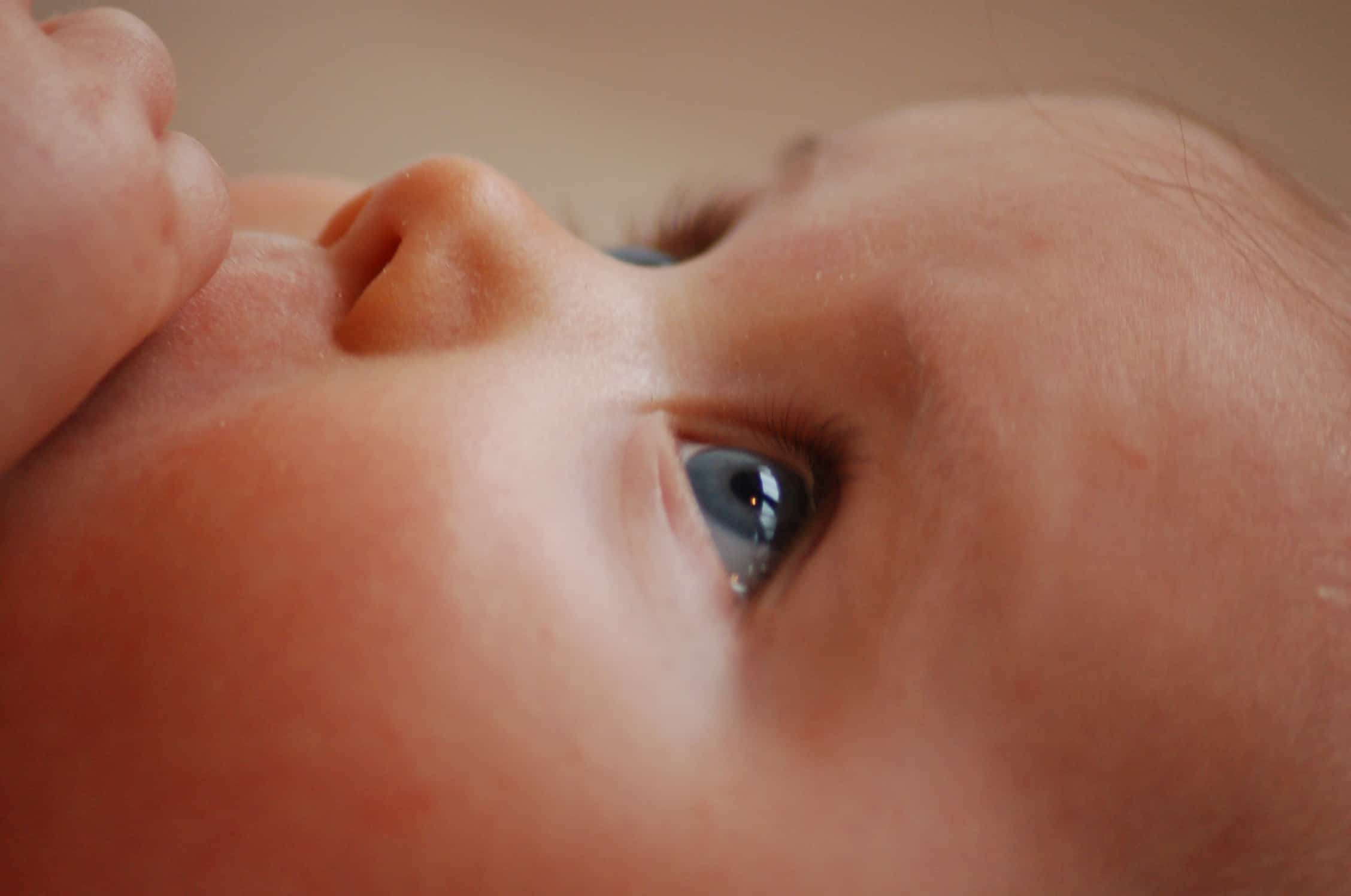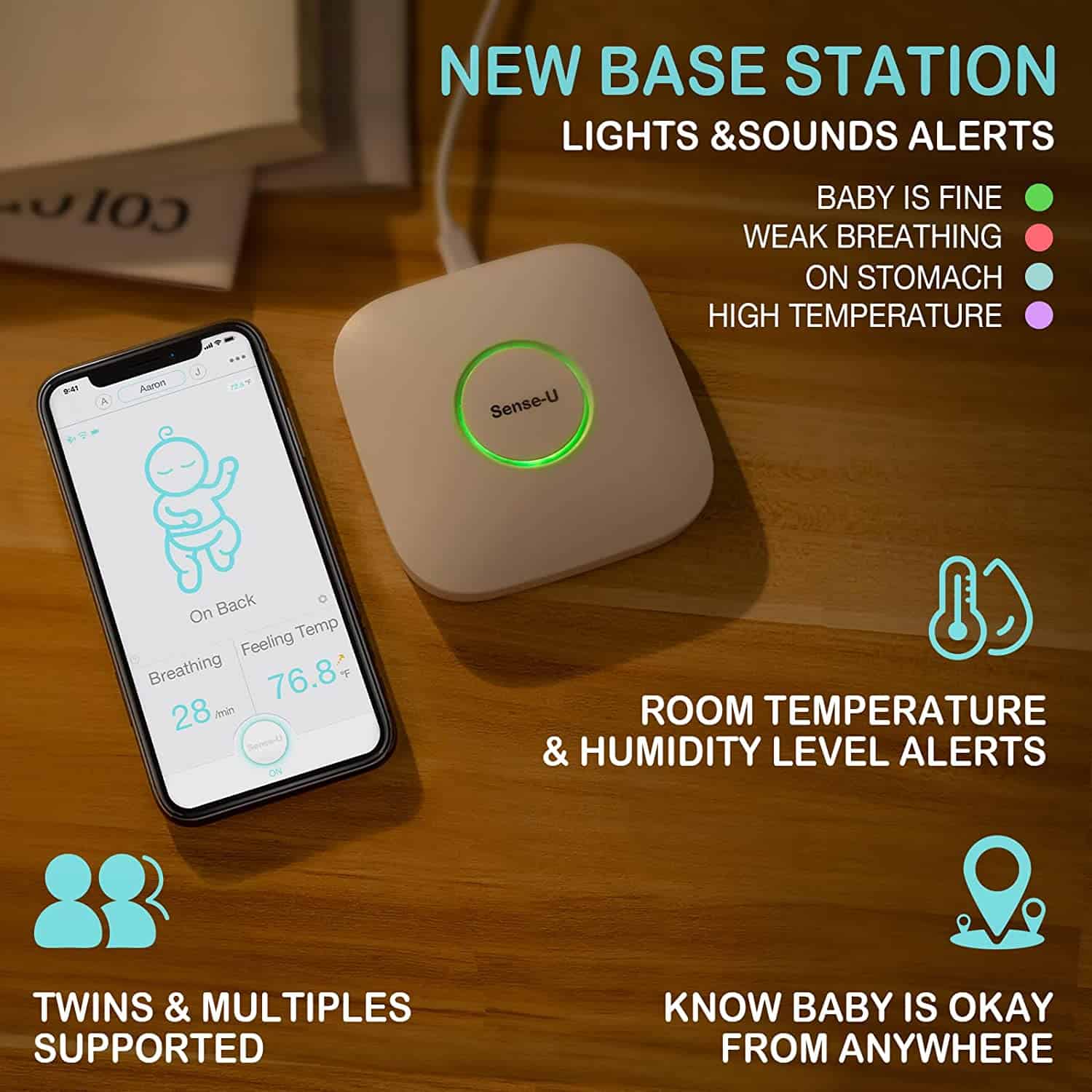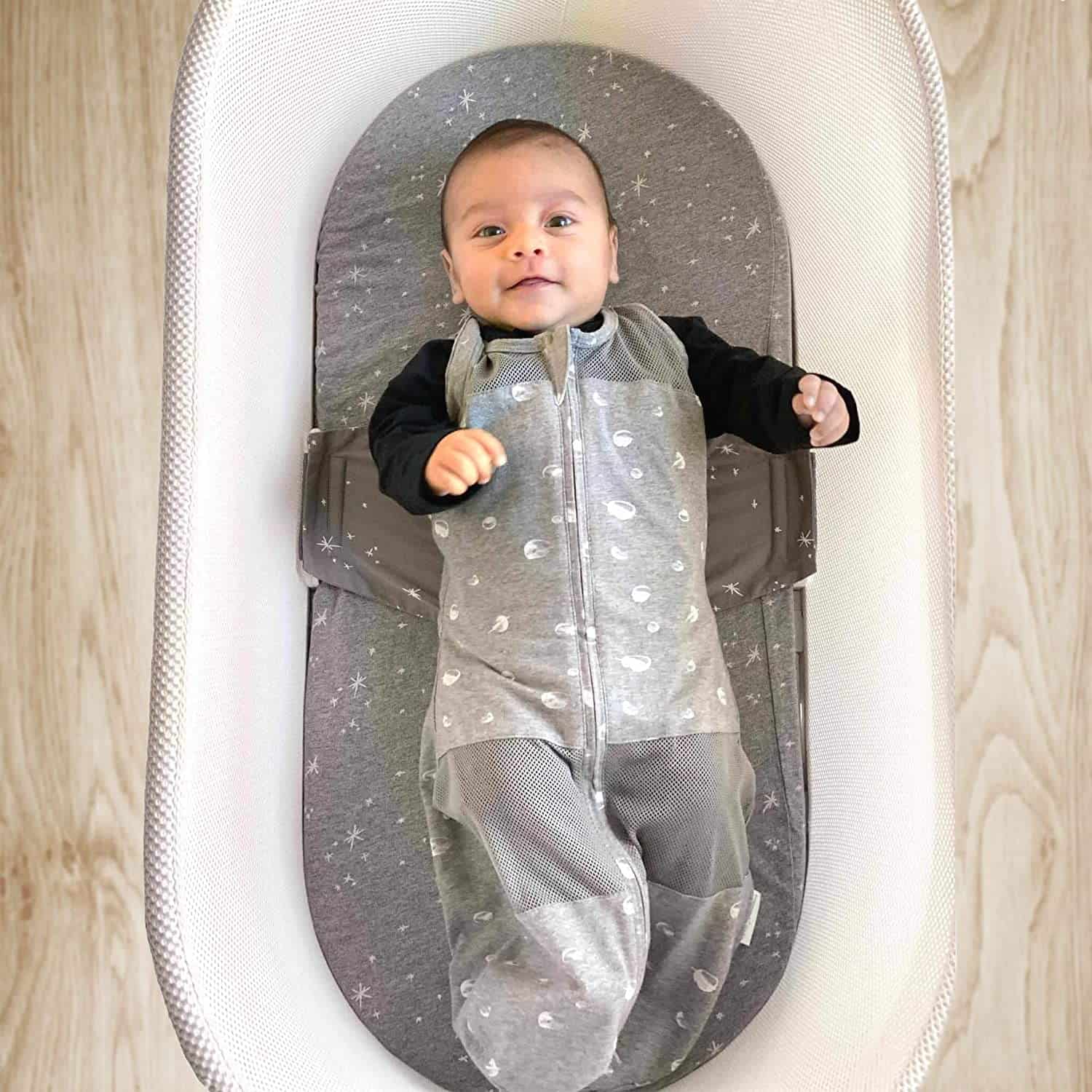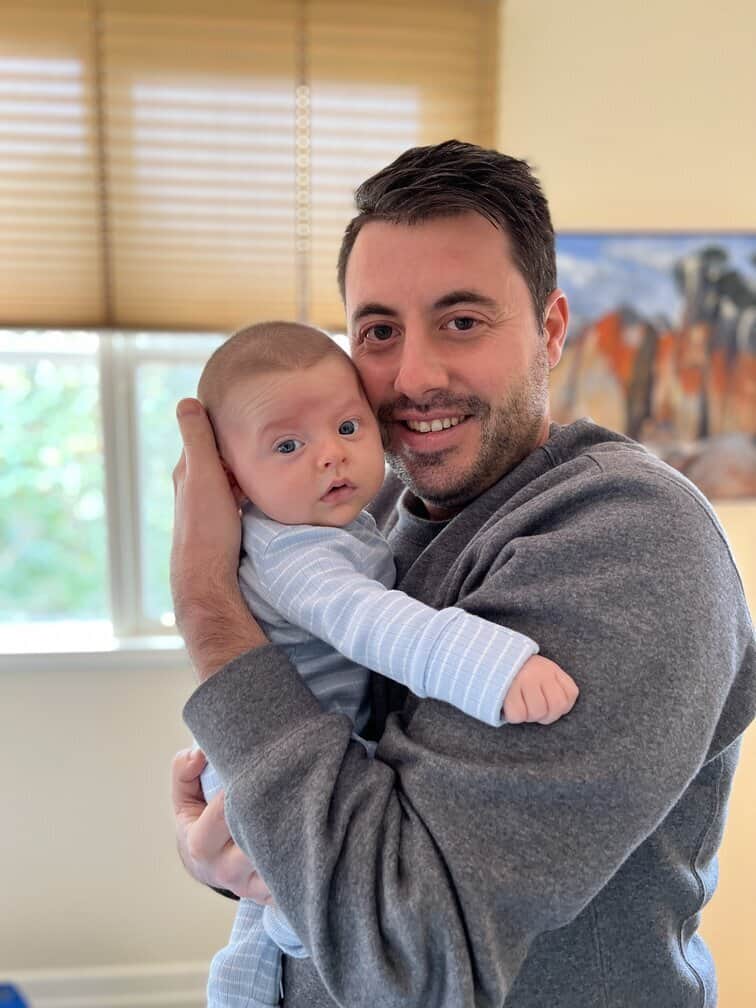Are you looking for some smart and practical 2 month old sleep schedule ideas? Expect no miracles because babies at this age cannot be properly sleep-trained yet, and sometimes they just completely miss the idea of a good night’s sleep. Still, I want to share a few tips that could help.
Sleep deprivation is undoubtedly the most commonly mentioned downside of becoming a parent. I’ve heard about it and feared it, and when the reality hit, it was indeed even more demanding than I could have anticipated.
It became particularly demanding about eight weeks in when the initial euphoria of being a father slightly wore off. Suddenly, I started feeling exhausted, and I desperately craved an uninterrupted night’s sleep – or at least some day-to-day schedule to use to plan my activities.
I won’t lie to you – there’s no miraculous trick to adapting your 2-month-old to a sleep schedule that would fit you, but you can still make a few adjustments to improve things. The key lies in understanding what you can and cannot expect from such a tiny baby.
How much sleep does a 2-month-old baby need?
So you’re wondering how many hours per day your 2-month-old should get to stay healthy, happy, and strong? According to the National Sleep Foundation, it is between 14 and 17 hours. This is typically divided into about 9 to 10 hours of sleep at night and 5 to 7 hours during the day.
The difference between the minimum and maximum sleep time suggests that each baby is individual, but also that this is a period of great change in their life. If you watch them closely, you’ll probably feel like you’re seeing a completely different baby on day 1 and day 30 of this month.
The 2-months-olds are no longer newborns and start to be much more curious and active. Still, they will not do much besides feeding and sleeping at this age. Playing, in the real sense, will become important to them only later.
Read also: Newborn Sleep Schedule Ideas
How many day naps does a 2-month-old baby take?
As mentioned above, a 2-month-old baby will most likely sleep around 5 to 7 hours a day during the daytime. This is commonly organized in 3, 4, or 5 blocks of naptime, following a similar pattern daily.
In our case, the little one typically took two naps before noon and two in the afternoon. As time passed, he became a bit more active during the afternoons, and his daytime sleep gradually reduced to three naps, which also helped with deeper and less interrupted night’s sleep.
Nevertheless, keep in mind that every baby is an individual human being with their own needs and customs. Some might need more or less sleep at the same age – and it’s perfectly fine unless they experience some related health issues.
Of course, as a new parent, you may struggle to identify a possible sleep-related (or sleep-affecting) health issue. I remember my wife and me being worried every other day about our son sleeping too long or too little or making weird sounds in his crib.
Is your 2-month-old’s sleep healthy?
First, a short disclaimer: I am not an expert on children’s health. If you doubt your baby’s wellbeing, whether in connection with their sleep or otherwise, waste no time and contact your pediatrician to arrange an appointment. The details in this section are purely informative.
Now let’s briefly discuss a few of the most common fears and worries associated with 2-month-olds and sleep:
Colics
Colics, painful bloating, or reflux can certainly interfere with your little one’s sleep schedule. Babies suffering from these issues are often frustrated and tearful as their bodies seem to be going through a lot of pain.
Needless to say, putting babies in such a state to sleep is almost impossible, and even if you succeed, there’s a good chance you’ll hear them cry again quickly.
To resolve your little one’s digestive problems, you must first know what’s causing them. Sometimes it takes switching to a new formula; at other times, you might need good probiotics from your doctor. It can, however, also be a sign of a deeper problem, so seeing your pediatrician is surely a good idea.
Sleep regression
Just when I thought our baby boy started understanding how nice it is to take a good nap, something changed, and he turned into an insomniac who sabotaged all our efforts to put him to rest with loud protests and angry kicking.
As I later learned, he went through what we call sleep regression, and it’s a very common thing. Instead of elaborating on this rather complex topic here, I am attaching links to some of our articles that explain it in detail:
SIDS
Sudden Infant Death Syndrome (SIDS) is one of the leading infant death causes in Western countries. It’s also one of the worst fears we as new parents face.
Just like it sounds, SIDS is a sudden, very unpredictable incident that can happen anytime between the 1st and 12th month of age. In most cases, however, it occurs before the baby reaches four months of age, typically during sleep.
Despite years of research, doctors and scientists still don’t have a clear answer to what causes SIDS or how to reliably prevent it from happening. Nevertheless, for greater peace of mind, we have followed these recommended precautions:
- Make sure your baby sleeps on their back at all times and cannot spontaneously turn to the stomach or side, which are positions mostly associated with SIDS.
- If possible, breastfeed your baby. Experts believe that breastfeeding (direct or with expressed milk) reduces the risk of SIDS. Of course, it has other benefits too.
- Share room – but not bed. Sleeping next to your baby in a safe co-sleeping crib or bassinet is, according to the experts, another effective safeguard against SIDS.
- For your peace of mind, you can also use a quality heart rate monitor, although some experts are not entirely convinced of its benefits.
I will share a few tips on useful products mentioned above later in this article.
Does your 2-month-old need a sleep schedule?
Now let’s move on to the most important question: Aside from putting the precautions above into practice, should you also try to set your 2-month-old on a sleep schedule?
Most pediatricians advise against it. Newborns are not yet capable of any serious sleep training, and following their natural rhythm and needs is a safer and more effective method of organizing your day.
There are some exceptions, though. If your baby is prematurely born and needs help gaining weight, you should ensure that they are fed every 3 to 4 hours, even if it means waking them up at night.
According to the book called Healthy Sleep Habits, Happy Child (I highly recommend reading it), you should stop this practice when your baby gets on the right track with gaining weight, usually in a few weeks from birth.
2-month-old´s sleep schedule ideas
Since sleep training a 2-month-old baby is not advised, I recommend considering the following schedule samples only an inspiration. It can give you a good idea of the typical day-to-day program with your baby, which can also be helpful if you’re only about to become a parent.
Sample sleep schedule no. 1
| 7:00 AM | Morning rise |
| 8:30 – 9:30 AM | First nap of the day |
| 11:00 AM – 12:00 PM | Second nap of the day |
| 1:30 AM – 2:30 PM | Third nap of the day |
| 4:00 – 5:00 PM | Fourth nap of the day |
| 6:30 – 7:00 PM | Fifth nap of the day |
| 8:00 PM | Start with your bedtime routine |
| 8:30 PM | Bedtime |
| 8:30 PM – 7:00 AM | Three or four feedings |
As you see, the first sample schedule considers five daytime naps. Whereas the first four last approximately 60 minutes each, the last one should be shorter to ensure that the baby won’t be too fresh when the evening bedtime comes.
Sample sleep schedule no. 2
| 8:00 AM | Morning rise |
| 9:15 – 10:45 AM | First nap of the day |
| 12:00 – 1:30 PM | Second nap of the day |
| 3:00 – 4:30 PM | Third nap of the day |
| 6:00 – 6:30 PM | Fourth nap of the day |
| 8:00 PM | Start with your bedtime routine |
| 7:45 PM | Bedtime |
| 7:45 PM – 8:00 AM | Three or five feedings |
The main difference between the two samples is that the latter includes only four daily naps. These are, however, slightly longer (except for the last one), and so is the night’s rest.
2-Month-Old Sleep Schedule: Three Products That Helped Us
As you already know now, taking complete control over your 2-months-old’s sleep schedule is not a realistic option. Instead, you can try to make sleep as easy, comfortable, and safe for them as possible. The following products made it much easier for us-
Co-sleeper like the Mika Micky Bedside Sleeper
Some parents stick to a separate crib with their babies, but our instincts told us that we would benefit from some extra closeness. That’s why we have invested in the Mika Micky Bediste Sleeper bassinet, which can be attached directly to the side of our bed. It was a good choice.
This co-sleeper complies with the CPSC safety standards. Experts even suggest using this type of crib as SIDS prevention. Our son absolutely enjoyed being closer to us during the night, and, as a result, he started sleeping deeper and woke up fewer times during the night.
The only real downfall of this product is that you can only use it until your baby is five months old or weighs 33 lbs.
Further reading:
Breathing/heart rate monitors like Sense-U
Although I’ve heard that there’s no hard evidence that the breathing and heart rate monitors can prevent SIDS, my wife and I felt better about our little one’s sleep when we started using it.
The anxiety and endless checks (which often woke the baby up unnecessarily) stopped, and we finally started relaxing when our son was sleeping.
As for the monitor itself, dozens of models are on the market, and their functionality can differ greatly. Based on hundreds of positive reviews, we have chosen the Sense-U monitor, which also measures a baby’s temperature and alerts you if they turn into a risky position.
Further reading:
Swaddle sacks such as SNOO
Some children like to be swaddled; others don’t. While our son started protesting swaddles lately, when he was two months old, he genuinely enjoyed them. When swaddled, he fell asleep much easier and remained calm and relaxed for a longer time.
We have tried several swaddles and sacks during this period. While all of them were pretty good, SNOO’s Swaddle Sack stood out thanks to its 100% organic materials, breathability, and extreme ease of use (even my clumsy hands could swaddle the baby in it correctly in a few seconds).
The only downside of this swaddle is its higher price. Still, I think it’s worth it.
Further reading:
FAQs
Question: How long can a 2-month-old stay awake?
Answer: Typically, babies around this age stay awake for about 45 to 120 minutes between their daytime naps. It can differ depending on the frequency and length of their naps.
Question: Why do babies fight sleep at 2 months?
Answer: If your baby slept well before but suddenly started fighting sleep, you’re going through a sleep regression phase. It can be caused by many different things, including excessive sensory stimulation, teething, illness, and hormonal changes.
Question: What time should a 2-month-old go to bed?
Answer: Since babies at this early age tend to sleep more frequently during the day, it is common for them to go to bed in the evening somewhat later than once they’re older. Still, aim to start your daily bedtime routine no later than 8 PM to set them on the right track for the future.
Conclusion: The Right Time to Go With the Flow
Managing your 2-months-old sleep schedule is not about finding the right tricks to make it all work for you. It’s more about learning to go with the flow and ensuring that it all goes as smoothly and healthily as possible. I can confirm from my experience that the sooner you accept this, the better.
Yes, you will be exhausted, confused, and sometimes even scared. But when you’re down, imagine for a second how new, scary, and confusing must the same situations currently be for your 2-months-old baby, who is totally helpless and entirely depending on you.
So, what is my best advice for a 2-month-old baby’s sleep schedule? Relax, listen to your instincts, and try to fulfill your son’s or daughter’s current needs. It sounds crazy, but you’ll probably miss this hectic time dearly one day.
As a new dad himself, David understands the struggles in dealing with a newborn’s sleep schedule. He knows how hard it is to work and deal with a lack of sleep at night. He thoroughly tests out products and can advise which are best for your little one. In his spare time, he enjoys riding ATVs and BMX.






